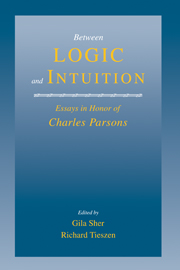Book contents
- Frontmatter
- Contents
- Preface
- I LOGIC
- II INTUITION
- Immediacy and the Birth of Reference in Kant: The Case for Space
- Geometry, Construction and Intuition in Kant and his Successors
- Parsons on Mathematical Intuition and Obviousness
- Gödel and Quine on Meaning and Mathematics
- III NUMBERS, SETS AND CLASSES
- Name Index
Geometry, Construction and Intuition in Kant and his Successors
Published online by Cambridge University Press: 02 December 2009
- Frontmatter
- Contents
- Preface
- I LOGIC
- II INTUITION
- Immediacy and the Birth of Reference in Kant: The Case for Space
- Geometry, Construction and Intuition in Kant and his Successors
- Parsons on Mathematical Intuition and Obviousness
- Gödel and Quine on Meaning and Mathematics
- III NUMBERS, SETS AND CLASSES
- Name Index
Summary
I begin with an issue concerning the interpretation of the role of intuition in Kant's theory of geometry that has recently seen myself on one side and Charles Parsons on the other. The interpretation I have defended is a version of what one might call the logical approach to Kantian intuition – an approach first articulated by Evert Beth and Jaakko Hintikka. On this approach the primary role of Kantian intuition is formal or inferential: it serves to generate singular terms in the context of mathematical reasoning in inferences such as we would represent today by existential instantiation. Accordingly, the primary feature that distinguishes Kantian intuitions from purely conceptual representations, on this view, is their singularity – as opposed, that is, to the generality of concepts. Parsons has objected, however, that this formal-logical approach downplays a second feature that Kant also uses to distinguish intuitions from concepts: namely, their immediacy. For Kant, conceptual representation is both general and mediate, whereas intuitive representation is both singular and immediate – that is, it is immediately related to an object. And here, Kant certainly seems to think that the idea of immediacy adds something important – something of an epistemological and/or perceptual character – to the bare logical idea of singularity. Parsons himself suggests that the immediacy in question is to be understood as “direct, phenomenological presence to the mind, as in perception,” and so, this second approach can be characterized as phenomenological.
Information
- Type
- Chapter
- Information
- Between Logic and IntuitionEssays in Honor of Charles Parsons, pp. 186 - 218Publisher: Cambridge University PressPrint publication year: 2000
Accessibility standard: Unknown
Why this information is here
This section outlines the accessibility features of this content - including support for screen readers, full keyboard navigation and high-contrast display options. This may not be relevant for you.Accessibility Information
- 31
- Cited by
